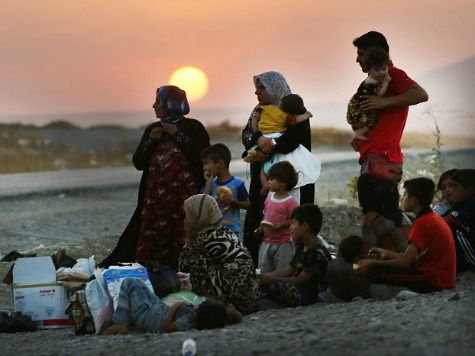
There was one part of Baroness Warsi’s resignation letter I admired: that was when, just after she’d condemned the Coalition’s inaction over Gaza, she brought the full weight of her righteous indignation to bear on Britain’s abject failure to stop the Yezidis being massacred in Iraq.
No not really. a) the Yezidis aren’t being killed by Jews, but rather by Muslims, which I guess doesn’t make it such a big deal and b) I doubt Baroness Warsi has even heard of the Yezidis. But then, to be fair, few people had until their bodies started being posted up in pictures on Twitter, often minus their heads, and with grinning ISIS jihadis posing behind them.
If you want to know more about the Yezidis (or Yazidis, as they are also spelt), then this excellent piece by Sean Thomas is a good place to start.
Yezidism is much older than Islam, and much older than Christianity. It is also deeply peculiar. The Yezidi honour sacred trees. Women must not cut their hair. Marriage is forbidden in April. They avoid wearing dark blue because it is “too holy”.
They are divided strictly into castes, who cannot marry each other. The upper castes are polygamous. Anyone of the faith who marries a non-Yezidi risks ostracism, or worse. Yezidism is syncretistic: it combines elements of many faiths. Like Hindus, they believe in reincarnation. Like ancient Mithraists, they sacrifice bulls. They practise baptism, like Christians. When they pray, they face the sun – like Zoroastrians. There are also strong links with Sufism, the mystical branch of Islam.
Then there is the devil worship: arguably, the Yezidi worship what Christians or Muslims might call “Satan”, though the Yezidi call him “Melek Taus”, and he appears in the form of a peacock angel.
And now these practitioners of perhaps the world’s oldest surviving religion are being killed in droves, beheaded, starved, condemned to die of thirst, if they’re lucky, just sold into slavery by the vicious Islamist killers of ISIS. Killed, let it be noted, far more deliberately and ruthlessly and in far greater numbers than the Palestinian victims of the Israeli incursion into Gaza. Yet where is the massive, Gaza-style outcry in the media? Where are the angry tweets from the usual Guardianista suspects expressing their outrage at this “genocide”?
(Actual genocide, this time mark you. Not this fake “genocide” the anti-Israel mob are freely and dishonestly employing, knowing what effect it will have on a nation born out of the Holocaust).
I’m not a neo-liberal interventionist myself. In Libya, in Afghanistan, in the two Iraq wars, we seem to have done far more harm than good.
But on this occasion I believe we have it in our power to make a real difference, at relatively little cost to our coffers and without risking the lives of our own soldiers. We should be doing everything we can to help the only force in Iraq capable of countering ISIS: the Kurdish Peshmerga.
This is exactly what Jonathan Foreman was presciently arguing at Breitbart London a fortnight ago in a piece entitled: the Kurds are our best shot against ISIS – we should stop messing them around
The Kurds have pleaded for help from Britain and the US governments. So far no help has been forthcoming. Indeed, one of the reasons for the success of the ISIS advance into formerly-Kurdish-held territory is that the Peshmerga are so low on ammunition and, starved of money by the regime in Baghdad, can’t afford to buy any more.
As Cheryl Benard argues here, the Peshmerga are all that stands between the butchers of ISIS and many tens of thousands of displaced Christians, Shia, Yezidis and other blameless innocents on the ISIS death list.
Instead of grandstanding and handwringing over Israel, isn’t it time the British and US governments took concerted action where they could make a real difference: not in Gaza but in the country whose current infernal mess (pottery barn rules, anyone?) they did so much to help engender – Iraq.

COMMENTS
Please let us know if you're having issues with commenting.